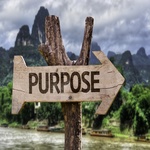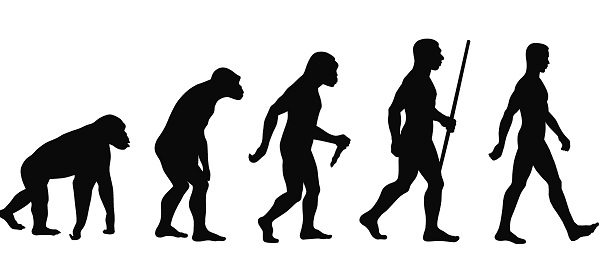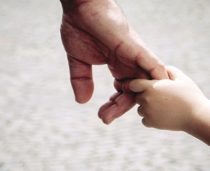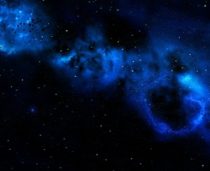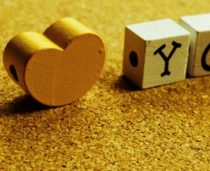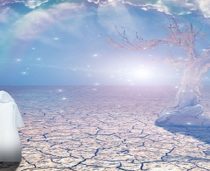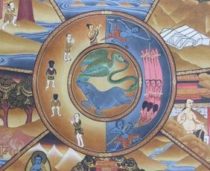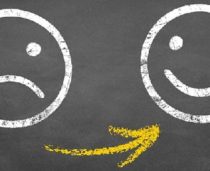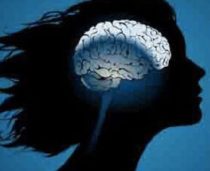Let’s just consider now the double helix, and the idea that I present here is that there must be other planets that have had a life cycle similar to the life cycles that have happened here on earth: heavy vegetative cycles, freezing, thawing, and other types of things going on. There is the desire to evolve to the point where humans ultimately evolve.
I think there’s something about the patterns of life and the sea life happening before the life on the land, life on the land evolving in specific ways, specifically the reptilian ages that came before the mammalian age.
I think that in this pattern we are in and certainly maybe different elsewhere over the pattern that we are in, millions of evolutions were necessary in order for us to develop that kinds of learning that we have developed, stored, and used in order for us to develop our uniquely human levels of intelligence – the ability to label and categorize almost endlessly. That ability to do that is one of the main things that set us apart from animals. I mean animals are as conscious as humans are but have a more limited range of things. They’re probably more aware of those things than we are.
In other words, focus is less scattered in animals. They tend to be focused on the present moment and whatever it contains, however, not solely true. I mean they have deep sadness as deep as any human or deeper. Particularly, if you consider elephants and likely whales, they form long, long-term bonds. When they lose a member of their family, their bond, their herd, whatever, is a loss. It’s not taken lightly. They will sometimes spend days with the body walking around and waiting for it to move and come with them or stand outside of the fence while an animal of another species is recovering from sickness or surgeries and something else. An elephant just stands with its head against the fence, just standing, waiting for its friend to come out.
The level of awareness and dedication to the bond is amazing, which is a whole situation when some of these elephants are being killed for their tusks – the young. Without their bond, I mean, it breaks the cycle up. The reason that this is significant is because that bond is their sense of well-being. When the oldest animals on earth feel insecure and lack that depth of connection, which is not what they do, not that they don’t make new connections, they certainly do, but they always have this familial bond. When we break that apart, we are breaking apart that very essence which we grew up in and which we evolved in. That is the sense of mammalian familiarity, that oxytocin bond, which makes us cling in more to whatever it is we can find.
We become tribal over political ideals or power, money, and hobbies. We become tribal over hobbies, over guns, over religion, and over all of the external trappings because that sense of belonging is disrupted.
Corporate America has been doing this to families for a long time. We need you to go to Toledo and head up our office there or Cincinnati, New York, San Francisco, or wherever it is we’re sending you, Tokyo, Baghdad, wherever it is, South America. The point is that the disregard for the familial bond has caused a lot more isolation than humans have ever known before. It used to be when you are born to a land that was your land. If for some reason you were removed from it and was put to someplace else, then that became your land; you’ve made the connections and whatever you can do there to have that depth.
This idea that a family unit or even a single individual can be shipped from situation to situation without that kind of length, I can’t say it’s new in the US, but it’s certainly present here. This happens on other levels too. I mean right now we’re having a lot of human migration in the world. People are leaving North Africa to go across the Mediterranean into Europe. We’re having refugee crisis and things happening in Africa.
Here in the Southwestern US, we’re fairly stable. Most of the immigrants that are here have been here for a long time. We’re not having a large influx of new immigrants. There are plenty here, but it’s a fairly stable population. People that are going back have gone back. Then that’s not to say there aren’t people being deported. Certainly, there have been and there are new immigrants coming in, but the population is more stable now than it ever has been. We have lower numbers of people that are coming in even though a couple of years ago, a lot of people in Central America sent their kids. Now that’s pretty much died down so that’s just a fairly steady flow of people trying to come in and steady flow going out, but the populations are being fairly constant.
Here’s the thing now. It’s not about the politics of that, but it’s about the breaking up with the families and that’s the idea about breaking of families here and deporting them and doing all this. A lot of people recognize the value of the family. A lot of grandparents move close to wherever their kids have lived.
Being in Arizona, we see a lot of people move here. Sometimes, their kids will grow up and get jobs and the jobs will be in some other cities so the grandkids grow up in another city and the grandparents stay out here until eventually they sell the house here and move to wherever it is the kids and grandkids are. I see this happen a lot, or they don’t move there. They stay here. The family stays separated.
The breaking of these connections is somewhat harmful in the large scheme of things. It’s not the healthy, loving, compassionate way to live that we have evolved to live. People don’t naturally move away from their family. I don’t mean to say never, but it certainly does happen. The US was made entirely of people, not entirely, because there were plenty of people here already, but all of the immigration largely was people leaving their family for one reason or another and coming here and settling here. Sometimes, the entire family would come, but what’s an entire family? Does that include grandparents, aunts, and uncles? How far does that go? I have those bonds on one side of my family and not on the other.
I can tell you my childhood was richer with the bonds present. My own child, I believe, she grew up largely without those. Her mother marrying a military guy and whose parents, my daughter’s grandparents are military and so everybody got moved around. Whether she was living with the grandparents or with her mother and the husband or back with the grandparents eventually, either way, there wasn’t a whole lot of stability. At least she had a stable place to be during grade school. In high school, things broke up again. She wound up living with me for high school. At least she had this bond with me; there was a connection and we could work things out and be together. I could let her live with me while she went to high school because at that time she needed some things to change.
Here’s what I want to say. We’re destroying habitat, we’re destroying species, and we don’t treat animals kindly. There are those that are cruel to them. These beings are beings of the earth. This is who raised us. It’s their consciousness to give birth to us in the first place. They allowed us to exist because the earth and the consciousness of the earth created the contents, and the same way, our bodies create the cells and the things that are in our bodies.
I believe that a higher mental capacity species is very likely to occur in mammalian evolution. I think it is part of what mammals do. Mammals are driven to survive and yet have familial bonds. Some of them recognize that there’s a lot to be said for outwitting one’s opponent in a contest.
I believe mammals have the capacity to turn that into a branch that develops the brain. I have no reason to think that they wouldn’t. Why wouldn’t mammals evolve into large brains creatures? Who’s to say, it couldn’t happen with reptiles? I mean it certainly could. Well, if you consider certain frogs and things, their fingers would probably be able to adapt to the same types of things that we’ve adapted to. Who’s to say at that level of intelligence, what kind of society they would develop?
With us, everything is dry. Perhaps, this happened with the reptiles. Things would be much wetter in the environment. It’s really hard to say. It might be an extremity for them to adapt to the desert, whereas for us, it’s fairly normal. It might be that adapting to a dryer environment helped the mammals to evolve in a different way without having everything, be it about climbing and biting.
It’s just so hard to say, but here we are as mammals having evolved this way. It’s entirely possible that a planet eventually will develop mammals. That could just be part of the evolutionary process of most planets. Mammals, of course, have qualities other than the reptilian qualities. Reptiles have a small amount of pain on the outside that has some acknowledgment of the need to care for certain things like the eggs and things like this. It’s not like all reptiles are completely devoid of compassion. I don’t necessarily think that’s true, but it’s possible that in order for compassion to really establish itself, that the mammalian brain was necessary. That may mean that it has to have a heating and cooling system in the body.
If you want to have a certain horsepower, you have to keep your engine cool. We can have air-cooled engines to a certain extent, but then in an environment like Phoenix, air-cooled engines are much more challenging. To especially build a large one would be very challenging because the concentration of heat. The dissipation rate into the air is less effective than the dissipation rate into water.
We’ve got the world that we’ve got and we are who we are, but here’s the thing, do all mammalian civilizations develop a problem with carbon in the atmosphere, a problem with toxic chemicals in the earth and in the water? I’m curious if this is a step in the evolution of all mammals, typically of mammal species, or is if this just one of the possible outcomes. It seems to me almost as though we’re smokers. We’ve been smoking for a long time. Here comes the consequences; we’ve done more stuff, and we’ve continued to do some destructive things just like a smoker does to their body. We’ve had plenty of opportunity to develop and now, though, we’ve had these issues that are going to drag us down.
The challenge for us is that this is the thing, our ability to produce hydrocarbons, our ability to produce heat to do the things that are done as a result of all the mining that we’ve done and extracting the oars and the oils and the way we use this. We’ve done all these things in order to develop our prejudice for comfort. Because we’ve developed our prejudice for comfort to such a heightened state, it may be impossible for us to stop producing the byproducts, the waste, and the environmental damage that come from our use of all these hydrocarbons, chemicals, and petroleum-based products, largely, and radioactive waste and radioactive mines, copper, and smelters. All of the things we’ve done in order to make our life more comfortable.
This is a survival skill, right? The ability to stop, refresh, and re-energize. These things are necessary for our survival. As early humans, the idea of seeking that leisure time, first of all, meant you’re not at war and you’re not fighting the next tribe to you. You want to get that peace; you want to have that opportunity for safety so you can raise the offspring. Some things can happen and everyone survives nicely. This has been a desire for us for a long time and not just for humans, but certainly for humans.
Humans have the ability to put waste off in the environment in order to gain for their own comfort as an individual. T hey have the ability, perhaps, one could say even the proclivity to better their own circumstances while causing others to have lower quality of life or experience even if it’s just temporary or whatever, which they would argue well, it’s just temporary. They’re only paying for it right now and then it will be paid for it. They move on about their business, except that someone else is paying for someone else’s pleasure. That is how I think is how we do what the Christian bible says, “eat the fruit tree of the knowledge of good and evil.” Eating of its fruit means taking the road of self-betterment before the harmony of the whole beings.
This is where the line is drawn or should be drawn. Are you taking and harming the rest of the world in order for you to feel better temporarily? I think the good is that which gives and feels the goodness of giving. You can’t choose who loves you, but you certainly can choose who you love in a way. It’s not metaphor I’m looking for.
If I love, then I’m sure to experience love.
If I wait for someone to love me, I don’t know. Then will I judge it, the quality of love? Will it be insufficient for me or I feel that I deserve more or better love in some way? Somehow I’m being slighted even though someone is loving me. Can you imagine someone feeling slighted over not being loved enough or in the proper way? I think it happens all the time.If you want to experience love and if you want to be sure of the love that you experience, be the giver because that’s the place to be anyway. The one who is the giver of love is the one who is in love.
I want to make sure you understand this. Don’t give to a taker. What I’m saying is don’t be the giver to a taker. Yes, be the giver. If you’re with a taker, it’s not going to feel as good as giving to another giver. You’re going to get anxious, you’re going to get insecure, and things are going to be weird. So don’t be the taker’s gift, but be the giver. Don’t be the taker. So someone is the taker and you’re the giver. You probably are going to have to cut them loose or find the gift inside of the whole thing because your happiness is part of the happiness of the world, part of happiness of the planet, part of the joy of life, and part of the good.



